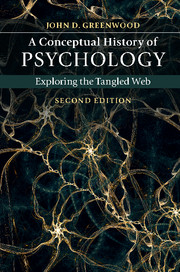Book contents
- Frontmatter
- Contents
- Preface
- 1 History, science, and psychology
- 2 Ancient Greek science and psychology
- 3 Rome and the medieval period
- 4 The scientific revolution
- 5 The Newtonian psychologists
- 6 Physiology and psychology
- 7 Theories of evolution
- 8 Psychology in Germany
- 9 Psychology in America: the early years
- 10 Functionalism, behaviorism, and mental testing
- 11 Neobehaviorism, radical behaviorism, and problems of behaviorism
- 12 The cognitive revolution
- 13 Abnormal and clinical psychology
- Epilogue: the past and future of scientific psychology
- Index
- References
1 - History, science, and psychology
Published online by Cambridge University Press: 05 September 2015
- Frontmatter
- Contents
- Preface
- 1 History, science, and psychology
- 2 Ancient Greek science and psychology
- 3 Rome and the medieval period
- 4 The scientific revolution
- 5 The Newtonian psychologists
- 6 Physiology and psychology
- 7 Theories of evolution
- 8 Psychology in Germany
- 9 Psychology in America: the early years
- 10 Functionalism, behaviorism, and mental testing
- 11 Neobehaviorism, radical behaviorism, and problems of behaviorism
- 12 The cognitive revolution
- 13 Abnormal and clinical psychology
- Epilogue: the past and future of scientific psychology
- Index
- References
Summary
In 1877, James Ward and John Venn petitioned the University of Cambridge in England to have experimental psychology introduced as an academic discipline. The University Senate refused to do so on the grounds that it would “insult religion by putting the soul on a pair of scales” (Hearnshaw, 1989, p. 125). In a 1907 paper published in American Medicine, Dr. Duncan Macdougall of Haverhill, Massachusetts, described his attempt to put the soul on a scale (Macdougall, 1907). He persuaded six dying patients to spend their last hours in a special bed that rested on a platform beam scale. By comparing the weight of the individual (plus bed) before and immediately after death, Macdougall estimated the weight of the human soul to be about “three-fourths of an ounce.” He repeated this experiment with fifteen dying dogs, who manifested no weight loss upon expiration, confirming the popular belief that animals have no soul (Roach, 2003).
From the dawn of recorded civilization, humans have not only speculated about the nature and causes of mind and behavior, but have also employed their ingenuity to test these speculations. In the seventh century BCE, the Egyptian king Psamtik I supposed that children with no opportunity to learn a language from other people would spontaneously develop the natural and universal language of humankind, which he presumed to be Egyptian (Hunt, 1994). He tested this hypothesis by having one of his subjects seclude a number of infants and observe which language they first spoke; he was disappointed to learn that they did not speak Egyptian. As the centuries progressed, critical thinkers continued to speculate about the nature and causes of mind and behavior and to subject their theories to empirical test. The process was accelerated by the scientific revolution in Europe in the sixteenth and seventeenth centuries and by the development of experimental physiology and evolutionary theory in the nineteenth century, which promoted the growth of the institutional science of psychology in the late nineteenth and twentieth centuries. The story of this progression, development, and growth is the history of psychology.
- Type
- Chapter
- Information
- A Conceptual History of PsychologyExploring the Tangled Web, pp. 1 - 19Publisher: Cambridge University PressPrint publication year: 2015



